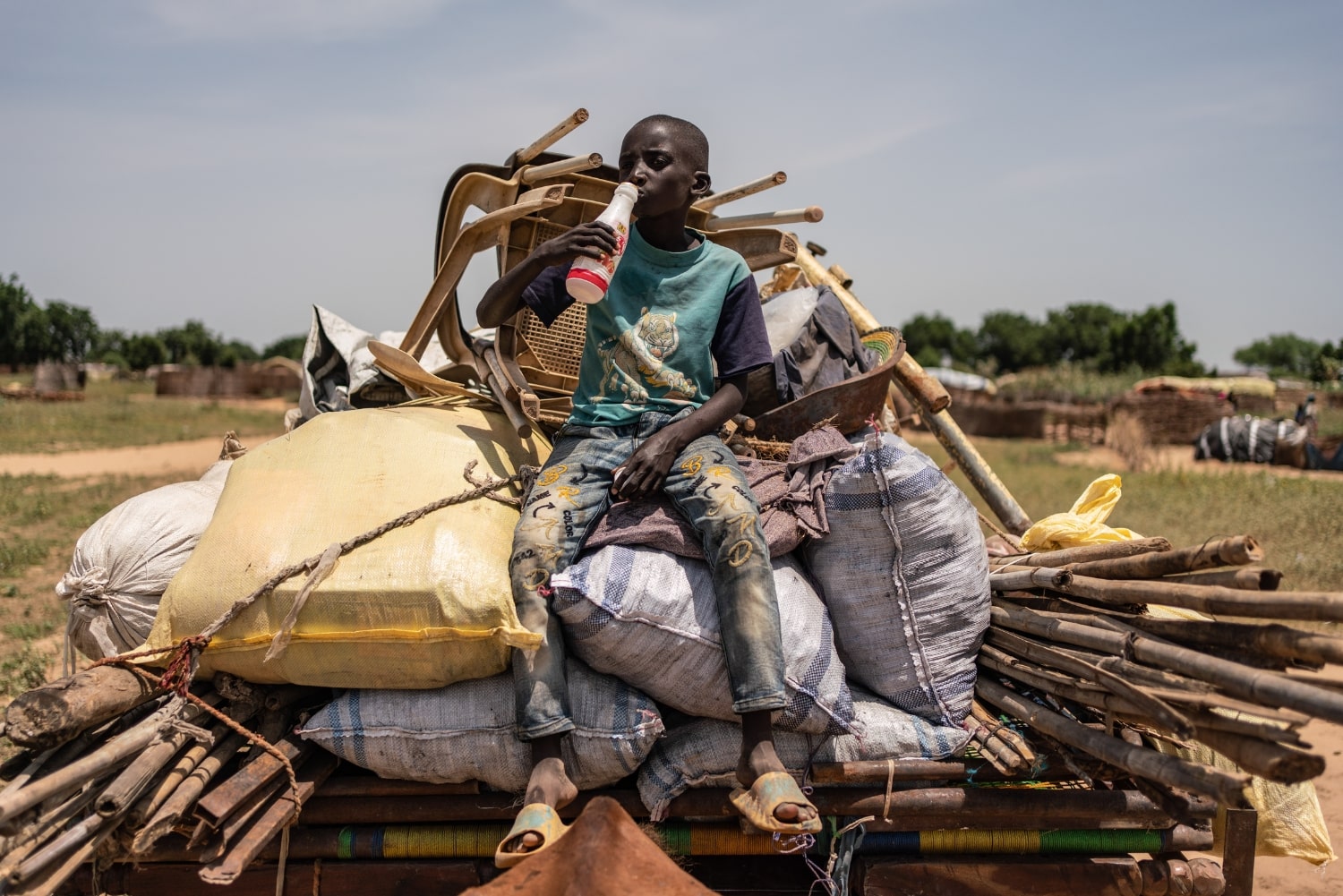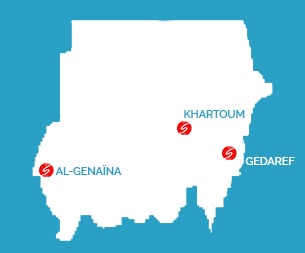Sudan was plunged into a war on 15 April 2023 that forcibly displaced more than 8.4 million people, within the country and to neighboring states. This massive population displacement has dramatically altered the living conditions of both the displaced and their hosts. In these complex socio-economic contexts, exacerbated by climate change, a large-scale humanitarian response is required.
“At the Sirba health center in West Darfur, there isn’t even a wall left to lean on” laments Fanny Vagne, field coordinator in Sudan for SOLIDARITÉS INTERNATIONAL. The widescale destruction of infrastructure, the violence of the fighting, food shortages and lack of access to drinking water are just some of the reasons why more than 8.4 million people have been uprooted from their homes since the return of war a year ago.
Displacement: the loss of livelihoods
When refugees leave their homes, they are forced to leave behind their possessions, taking with them only the bare essentials. Torn from their land, and sometimes their livestock, they leave with no real hope of finding them again. “There is systematic and meticulous looting. Metal in particular. Roofs, doors, house windows and all the furniture are gone”, Fanny points out. On the roads to exile, too, “the little that people were able to take with them is stolen from them. Extortion and violence deprive them of everything,” she adds.
This vulnerability is exacerbated by the fragmentation of the social fabric, essential to meeting people’s vital needs. “Right from the start of the war, when my family and neighbours were locked in our homes, we organized meetings where we agreed to pool our food. We said: if anyone runs out of anything, we’ll share it. Water, food, medicine, everything”, says Aldambari, a Geneina resident who joined SOLIDARITÉS INTERNATIONAL in October 2023. Solidarity networks are undermined by forced displacement. The physical distance between relatives and neighbors, who used to be there for each other, undermines people’s resilience.
Sudan
Context and action- 43 million inhabitants
- 172nd out of 191 countries on the Human Development Index
- 21.000 people helped
Exile within one’s own country
In Sudan, three-quarters of population movements took place within the country’s borders. “People tried to flee at night. During the day, movement was not allowed, as it was too dangerous”, recounts Aldambari. The Khartoum region, where fighting has been particularly intense since the start of the war, accounts for 55% of internal displacements.“Many of those who left Khartoum took refuge in Gedaref, in the east, which was quieter. There, people were welcomed by the locals, and there were few camps”, confides Charline Petitjean, field coordinator for the NGO. For others, the situation was more trying, as the host towns were in turn attacked, forcing people to flee once again. In Darfur, a region marked by ethnic clashes, the forced cohabitation of different communities is rekindling tensions, against a backdrop of rivalry for access to food and water resources.

September 2023, Adré, Chad: Ali, aged 7, drinks water while sitting on the belongings his family managed to take with them as they fled the town of Murnei in West Darfur.
Photo: © Abulmonam Eassa
Beyond the borders, the chaos continues
At regional level, the impact of the war is considerable, with 1.7 million people having left Sudan to take refuge in a neighboring country. Chad, South Sudan, Egypt, Ethiopia and the Central African Republic have had to cope with a massive influx of destitute, traumatized and wounded people, mainly women and children. Without questioning the need to receive these people, it is even more difficult to do so in economically fragile countries, already beset by internal and regional tensions. Increased pressure on resources, exacerbated by climate change, raises the question of the sustainability of hosting refugees.
In Chad, over 560,000 displaced people have crossed the border from West Darfur, mainly into Ouaddaï and its border regions, Sila and Wadi Fira. Despite initiatives by local authorities to expand camps and relocate families to sites further away from the border, the number of shelters available is insufficient in the face of a worsening situation. “Some families had fled to Chad at the height of the fighting, then returned to Sudan when things calmed down, and now they’ll have to go back because they have no food. Border movements will intensify even more, as agricultural stocks are depleted,” warns Annie Brett, who works for SOLIDARITÉS INTERNATIONAL in Sudan.
In South Sudan, conditions for the 620,000 displaced people are not much better. 78% of arrivals are South Sudanese6 returning to their country of origin, having taken refuge in Sudan during the deadly 2013 – 2016 civil war in South Sudan. The humanitarian situation there is still alarming: more than three out of four people need humanitarian assistance for food, water and shelter7. The population movements caused by the war in Sudan have necessarily exacerbated needs and put further pressure on already failing and largely inadequate infrastructures. In response to the urgency of the situation, SOLIDARITÉS INTERNATIONAL has extended its scope of action in the states of Upper Nile and Unity, the main areas of arrival in the north of the country.
Egypt, Ethiopia and the Central African Republic are also facing immense difficulties in accommodating people displaced by the war in Sudan.
The region has been hit hard by climate change, even though it contributes only marginally to the problem. Everywhere, successive periods of drought and powerful floods disrupt the agricultural cycle, damaging crops and slimming harvests, if not destroying them altogether.
“The situation is very bad everywhere. There aren’t enough for the refugees. People are going to die, whether in Sudan, Chad or elsewhere” warns Aldambari. The international community has been warned. Emergency aid is needed to support the host regions and alleviate the ongoing humanitarian disaster.
Header photo: © Abulmonam Eassa

